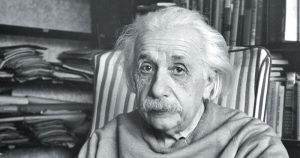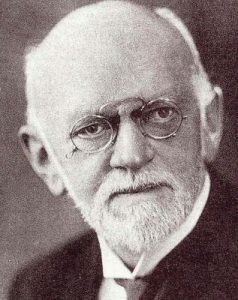I said in my previous entry in the Basic Wardrobe that, by the time Einstein presented his equations of general relativity on 25 November 1915 at the Berlin Academy of Sciences, David Hilbert had already presented his equations to the Göttingen Academy of Sciences five days earlier, in a paper dated 20 November. This paper was published a few weeks later, and in it the formulas for gravitation are identical to those Einstein presented on 25 November for his general theory of relativity – published on 2 December. And I asked: could it be said that Hilbert anticipated Einstein in the formulation of general relativity?
Well, the answer is a categorical no, but that no has one or two very interesting loopholes.
The truth is that Hilbert and Einstein corresponded intensively during the final part of their research in November 1915. Specifically, on 7 November, Einstein wrote to Hilbert telling him of the changes he had made to what he had done with Grossmann. Five days later, he informed him of the new direction his ideas had taken, which corresponded to the changes he had outlined in Berlin on 11 November. Hilbert, in turn, replied to Einstein presumably with information about his own achievements – some letters have not been preserved – and invited him to a lecture he was to give in Göttingen on 16 November about his discoveries – relations must have been good because Hilbert offers his own house: “My wife and I would be delighted to have you stay with us”. Einstein replied by declining the invitation because of accumulated fatigue and stomach problems, but more probably because of lack of time, since Einstein spent every second of those days fine-tuning the final version of his theory and proving that he could account for the motion of Mercury’s perihelion. On 18 November, Einstein again wrote to Hilbert that his proposals were in agreement, although it is not clear which of his theories he meant by agreement, since Einstein proposed three different theories between 4 November and the final one of 25 November.
But, as I said above, Hilbert had presented his five days earlier, so why is Hilbert not considered to be ahead of Einstein in the formulation of general relativity?
 On the one hand, Hilbert made use in his investigations of all the advances that Einstein had made in solving the problem between 1907 and mid-1915. These advances were many and decisive, but they can be summed up in just one sentence: Einstein synthesised the principle of equivalence and general covariance as guidelines for the formulation of the equations in the framework of Riemannian spaces. Einstein, on the other hand, owed little or nothing to Hilbert’s advances.
On the one hand, Hilbert made use in his investigations of all the advances that Einstein had made in solving the problem between 1907 and mid-1915. These advances were many and decisive, but they can be summed up in just one sentence: Einstein synthesised the principle of equivalence and general covariance as guidelines for the formulation of the equations in the framework of Riemannian spaces. Einstein, on the other hand, owed little or nothing to Hilbert’s advances.
Some readers may think that, despite this, Hilbert may well have been ahead of Einstein in the end. The answer is still in the negative. In addition to what Hilbert owed to Einstein, Hilbert’s equations, although formally identical to Einstein’s, had another meaning: namely, the debatable starting point of considering mass as a property of the electromagnetic field. This was a great weakness from the point of view of physics, as Einstein would point out to several fellow physicists in letters written in 1916: “Hilbert’s description does not appeal to me, it is unnecessarily specialised with respect to “matter”, unnecessarily complicated, and unnatural in its construction”; and also: “Hilbert’s assumption about matter seems to me childish, in the sense of a child who does not know any of the tricks of the outside world. In any case, it is not acceptable to mix the sound considerations arising from the postulate of relativity with such daring and unfounded hypotheses concerning the structure of the  electron or matter. I readily admit that the search for a suitable hypothesis is one of the most important theoretical tasks of the present day” – Einstein was referring here to the search for a unified field theory for gravity and electromagnetism, a task to which he subsequently devoted decades of fruitless work.
electron or matter. I readily admit that the search for a suitable hypothesis is one of the most important theoretical tasks of the present day” – Einstein was referring here to the search for a unified field theory for gravity and electromagnetism, a task to which he subsequently devoted decades of fruitless work.
And even with that difference in the meaning of the equations, wasn’t it Hilbert who first found them? And the answer is definitely no. Although this is something that has been discovered only very recently. Specifically in 1997, when historian of science Leo Corry (and other colleagues) discovered that Hilbert had revised the proofs of his lecture of 16 November on 6 December. In that revision, Hilbert made two important modifications. The first made his equations general covariants, which they were not in the original version of his paper; while the second modification affected the explicit expression of the equations themselves, and he predictably made that modification in the light of what Einstein had said on 25 November and published on 2 December. Hilbert, in fact, included in his own handwriting a correction in the proofs referring to the gravitational potentials where he stated: “First introduced by Einstein”; to which was added an express reference to Einstein’s work: “The resulting differential equations of gravitation are, as I see it, in complete agreement with the magnificent theory of General Relativity established by Einstein in his last paper” – a reference that would have been complete and definitive if he had included the date on which he revised the proofs in print.
Einstein initially did not take kindly on Hilbert’s behaviour, and wrote to a colleague claiming that Hilbert intended to appropriate part of his discoveries. The final publication of Hilbert’s article with the explicit mentions of his work calmed the waters, however, and in late December 1915, Einstein wrote to Hilbert: “There has been some resentment between us, the cause of which I do not wish to discuss here. I have fought against the resulting feeling of resentment, with complete success. I think of you again with complete cordiality, and I beg you to do the same for me. It is a real pity that two colleagues who, in one way or another, have managed to free themselves from this petty world, cannot mutually enjoy each other”.
References
L. Corry, J. Renn y J. Stachel, Belated decision in the Hilbert-Einstein priority dispute, Science 278, 1270-1273, 1997.
A.J. Durán, El universo sobre nosotros, Crítica, Barcelona, 2015.

Leave a Reply